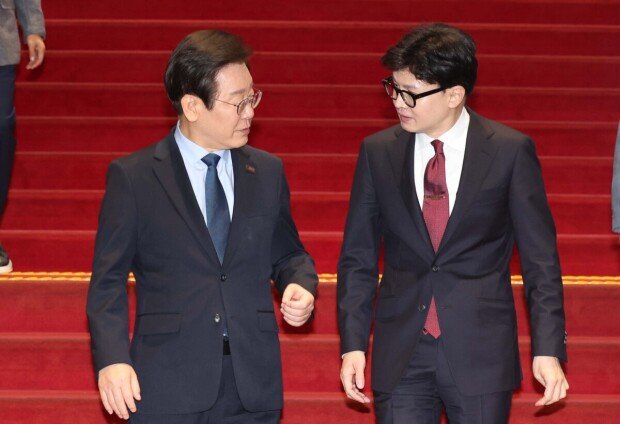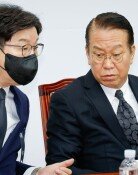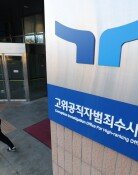Political leaders must reach consensus on 'Mrs. Kim Special Prosecutor Act'
Political leaders must reach consensus on 'Mrs. Kim Special Prosecutor Act'
Posted October. 23, 2024 08:44,
Updated October. 23, 2024 08:44

Ruling People Power Party leader Han Dong-hoon and Democratic Party leader Lee Jae-myung have agreed to hold a meeting, marking a significant political development amid rising tensions over a proposed special investigation into First Lady Kim Keon Hee. Han proposed the meeting unexpectedly on Tuesday morning, just hours before his scheduled meeting with President Yoon Suk Yeol, and Lee accepted the offer just within three hours. Some see the move as Han applying pressure on the president.
During Han’s meeting with Yoon, discussions reportedly focused on the ongoing controversy surrounding First Lady Kim. Han expressed concerns about the growing momentum behind the opposition’s push for a special investigation into the First Lady, telling Yoon, “I persuaded 30 lawmakers during the re-vote on her special prosecution act, but I’m worried the situation may worsen.” Han urged the president to take preemptive measures to block the opposition’s efforts. President Yoon, however, reportedly responded, “If our lawmakers side with the opposition, there’s nothing I can do about it,” signaling a hands-off approach. Regarding demands for Kim to reduce her public appearances, Yoon added, “She’s already significantly scaled back her activities and won’t engage in anything unnecessary,” giving an ambiguous response. When asked about personnel changes involving figures associated with Kim in the presidential office, Yoon reportedly stated, “If you can provide concrete evidence on who causes what sorts of issues, I’ll take action,” a response close to a refusal.
Within the ruling party, concerns are growing that it may become increasingly difficult to prevent defections in future votes on the special law. While a re-vote in the National Assembly on October 4 resulted in the bill being rejected, the number of ruling party lawmakers who defected increased to four. The Democratic Party has since introduced the bill again, marking the third attempt. Uncertainty surrounds the potential outcome if the president vetoes it again and it heads for another re-vote.
Public sentiment is increasingly turning against the government after prosecutors repeatedly decided not to indict the cases involving the First Lady. Many believe that the investigation cannot be trusted unless conducted under a special prosecution and that a proper legal judgment should be sought through a court trial, if necessary. In this situation, if the president does not give the ruling party any political justification to block the 'Mrs. Kim Special Law,' the ruling party will have no choice but to align with public sentiment. As the ruling party, they also have the political responsibility to resolve the endlessly recurring deadlock caused by the opposition's unilateral passage of laws and the president's veto.
However, the ruling People Power Party believes that the opposition’s special investigation proposal is biased from the start, with the selection of the special prosecutor lacking neutrality and the scope of the investigation being too broad. Yoon’s follow-up dinner meeting with floor leader Choo Kyung-ho after his talk with Han suggests the president is determined to prevent further defections and keep the party in line. For the Democratic Party, if it is not simply using the special investigation as a political tool, it should propose a law that ensures the neutrality and minimality of the special prosecutor. President Yoon's stance is clear—he is ready to face the challenge. Now, it is up to the ruling and opposition party leaders to find a compromise that reflects public sentiment.







